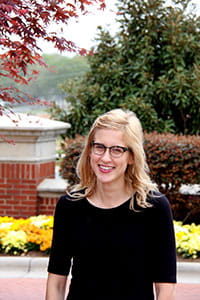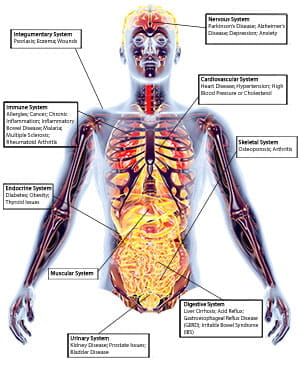How one MPH graduate is translating scholarly research into programs for health and wellness

All 27 hands were in the air in response to a question Aubrey Mast ’12, an MPH graduate, asked as she stood in front of a 7th grade class. Every single child said he or she was affected by diabetes. With that kind of evidence, it’s difficult not to feel like her work in public health is critical. “The foundation of all our issues is access,” she says. “If you have diabetes, you have access to medications. But maybe you also have access to local blueberries that are known to stabilize glucose.”
Mast works for North Carolina State University’s Plants for Human Health Institute (PHHI), a part of the North Carolina Cooperative Extension Service. The mission of the program is to provide citizens with access to knowledge generated by public universities. That means Mast and her colleagues create programs that can be implemented across the state to impact health behaviors. “Giving people tools to prevent diseases and that are accessible at their farmers’ markets, their grocery stores, and maybe even in their backyards is the most important work I can possibly do in my life,” Mast says.
Her largest project to date as Extension associate for nutrition has been helping develop a web resource called Healthy Living. The user-friendly website highlights research-based connections between food and disease and is continually updated as more research findings are published. The goal? To make peer-reviewed scholarly research accessible to consumers so they can improve their relationships with food.

Mast completed her undergraduate degree in health wellness and promotion, but soon realized she wanted to make a difference on a larger scale and would need more education to do that. “Walden gave me an understanding of how to create policies and programs that can be regenerated to impact people in multiple areas,” Mast says. Since getting her MPH, Mast has become a certified holistic health coach and is pursuing a certification in herbalism. She’s now taking that education and her role at PHHI to the community.
She has spearheaded a 6-week series with local doctors’ offices to give patients the tools and techniques to implement PHHI’s research in their kitchens. At a cooking class with the local health department to teach low-income citizens food-preparation skills for weight loss and prevention of illness, Mast emphasizes that the information provided on Healthy Living is versatile: “There are multiple ways you can change your lifestyle through food. We provide information about cooking, preserving, fermenting, and dehydrating crops.”
Mast is hopeful that her efforts will change lives in North Carolina and throughout the country. “We are consistently accruing more medical costs as a society,” she says. “Those could be prevented or reduced by using foods known to impact body system functions. What gives me incredible comfort is that I am promoting all peer-reviewed scholarly research. We’re not saying, ‘Only eat a grapefruit for the next 10 days and you’ll do x, y, and z.’”




